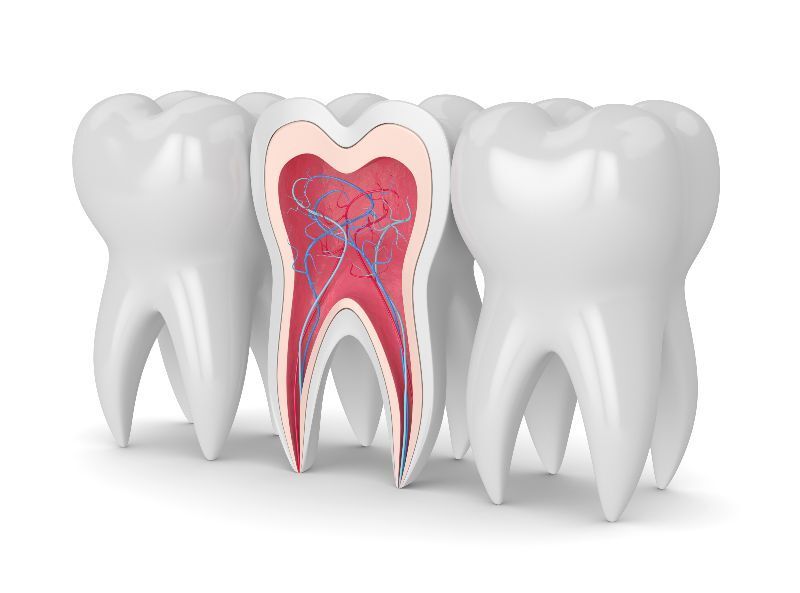Root Canal Therapy In Dallas
What Is A Root Canal?
Toothaches can be painful and distracting, commonly signifying decay or infection. While severe tooth infections are incredibly uncomfortable, root canal therapy can relieve that discomfort quickly. At Lakewood Dental Studio,
Dr. Leisa Robotham uses modern techniques to perform root canal therapy as a comfortable procedure that can help stop the spread of decay and restore the integrity of a damaged tooth.


Did You Know…
61% of individuals put off dentist appointments. Sadly, avoiding dental appointments can lead to poor oral hygiene and a need for more extensive dental treatments, like root canal therapy or extraction.
READY FOR YOUR APPOINTMENT?
What To Expect With Root Canal Treatment
-
Exam & X-Rays
ButtonBefore you undergo any treatment, your dentist will examine your mouth and review any x-rays or other images to diagnose the cause of your toothache. If the cause turns out to be a tooth infection, your doctor will determine the extent of the damage and decide if root canal therapy can treat the problem.
-
Local Anesthesia & Sedation Options
ButtonTo start things off, your dentist will clean and numb the treatment site, all the way down to the including the nerves with local anesthesia. If you would like to be sedated during the procedure, your doctor will help you decide what kind of sedation will be best for you.
-
Removing Decay & Infected Pulp
ButtonOnce the treatment area is sufficiently numb, your dentist will begin removing any decayed material beginning with the enamel. They will continue towards the center of the tooth, and clear any infected pulp from inside the tooth. Once the interior of the tooth’s canals have been thoroughly cleaned, the area is flushed with disinfectant to eliminate any remaining bacteria.
-
Filling The Root Canals
ButtonTo fill the space left by the decayed material, the interior of the tooth will be filled with “gutta-percha,” an inert, rubber-like material that supports the inside of the tooth to maintain its structure.
-
Sealing Or Capping The Tooth
ButtonDepending on how much enamel was removed during the procedure, the appearance and function of the tooth will be restored with either a filling or a dental crown.
-
Exam & X-Rays
ButtonBefore you undergo any treatment, your dentist will examine your mouth and review any x-rays or other images to diagnose the cause of your toothache. If the cause turns out to be a tooth infection, your doctor will determine the extent of the damage and decide if root canal therapy can treat the problem.
-
Local Anesthesia & Sedation Options
ButtonTo start things off, your dentist will clean and numb the treatment site, all the way down to the including the nerves with local anesthesia. If you would like to be sedated during the procedure, your doctor will help you decide what kind of sedation will be best for you.
-
Removing Decay & Infected Pulp
ButtonOnce the treatment area is sufficiently numb, your dentist will begin removing any decayed material beginning with the enamel. They will continue towards the center of the tooth, and clear any infected pulp from inside the tooth. Once the interior of the tooth’s canals have been thoroughly cleaned, the area is flushed with disinfectant to eliminate any remaining bacteria.
-
Filling The Root Canals
ButtonTo fill the space left by the decayed material, the interior of the tooth will be filled with “gutta-percha,” an inert, rubber-like material that supports the inside of the tooth to maintain its structure.
-
Sealing Or Capping The Tooth
ButtonDepending on how much enamel was removed during the procedure, the appearance and function of the tooth will be restored with either a filling or a dental crown.
Types Of Root Canal Therapy
ANTERIOR ROOT CANALS
Anterior root canal procedures are performed on your anterior (front) teeth. Because your front teeth are smaller, with less surface area, anterior root canals are a more complex procedure than posterior (rear or molar) root canals.
During an anterior root canal, the opening must be made on the lingual (the side that faces the tongue) surface of the tooth. Once the inside of the tooth has been cleared of bacteria and decay, the tooth will be restored with a filling or a dental crown.
POSTERIOR ROOT CANALS
Posterior root canals treat infected molars or premolars, teeth that reside in the back of the mouth. Due to their location and pitted, grooved surfaces, posterior root canals are a more common treatment than their anterior counterparts. During a posterior root canal, the large surface area of a molar or premolar crown allows doctors to create an opening at the top of the tooth. Then, the dentist puts a dental crown on the tooth to strengthen it.
In a posterior root canal, an opening is made in the crown, or top, of the infected tooth, which provides easy access to the interior pulp and root canals. Once the inside of the tooth has been cleared of bacteria and decay, the tooth will be restored with a filling or a dental crown.

Did You Know…
Around 25 million root canals are performed every year.
THINK YOU MAY NEED A ROOT CANAL?
Have Questions About Root Canal Procedures? Find Answers Here.
-
When do you need a root canal?
If you’re experiencing a tooth infection, chances are you will need root canal therapy. Tooth infections generally happen in one of two ways:
1. Cavities can eat away at the outer layers of your enamel and into your dentin. The decay will eventually reach the interior of the tooth to expose the vulnerable pulp to infection-causing bacteria that causes the infection.
2. Dental trauma can create a chip or a crack in the enamel and dentin, allowing bacteria to enter the nerve and blood vessel-filled pulp.
No matter how the infection occurs, it will cause the pulp to begin to decay and eventually die. When this happens, you’ll experience a toothache, gum inflammation near the tooth, and tooth sensitivity to temperature and pressure.
-
Does Root Canals Hurt?
Root canal therapy has come a long way in recent years, and modern techniques make a root canal a comfortable procedure. While you should not feel discomfort, you might feel a little pressure. Also, patients who receive root canal therapy can expect tooth pain to be relieved almost instantly.
Your mouth will be entirely numbed during treatment, and you can even choose dental sedation if that’s your preference. Root canal therapy is the best way to alleviate the pain and discomfort of an infected tooth, which can be unbearable.
-
Can Root Canal Treatment Fail And What Happens If It Does?
Root canals are among the most effective dental treatments available, but the treatment can fail in rare cases. If any decayed material or bacteria is left behind, the infection can return. If the infection returns, you’ll return to our office for endodontic retreatment, during which your tooth will be reopened, and the root canal process will be repeated to ensure the infection is completely removed.
-
Does insurance cover root canal therapy?
Root canal therapy is generally covered, at least in part, by most major dental insurance providers. However, it’s best to consult with your insurance provider to understand your benefits.

Did You Know…
Root canal therapy can save you from needing more complex, invasive treatments.
READY FOR YOUR NEXT DENTAL APPOINTMENT?
WE ARE SO GLAD YOU ARE HERE
Let’s Stay In Touch!
Hours
- Monday
- Closed
- Tuesday
- -
- Wednesday
- -
- Thursday
- -
- Friday
- -
- Saturday
- Closed
- Sunday
- Closed
All Rights Reserved | Lakewood Dental Studio
Website built by Energize Group | Privacy Policy





